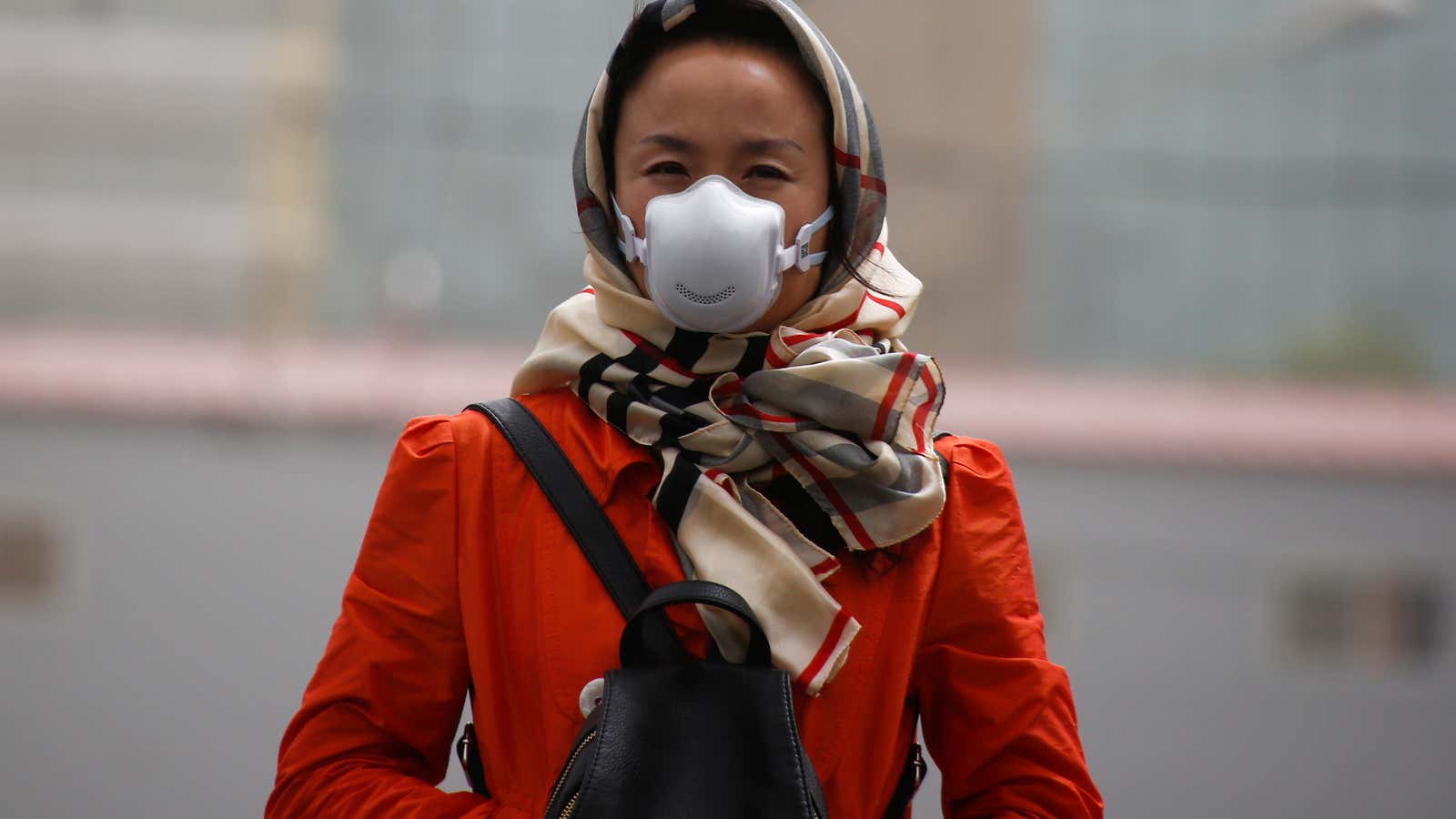Big Beauty has been all about skincare lately, and that part of the industry is thriving, thanks in large part to its ballooning anti-aging category. But another category of skincare might be the next growth area: As air quality declines in cities around the world, “anti-pollution” products are making their way into the mainstream, holding new appeal for urbanites trying to protect their skin.
The World Health Organization has warned that air pollution is the largest health risk humans face. But the market research firm Euromonitor, in its latest report (PDF) on the global cosmetics market, suggested that for beauty companies, city smog may have an unexpected silver lining: “As the urban population globally is expected to grow… The need for skin care which would protect against one of the biggest problems associated with large cities, pollution, is set to expand, positively contributing to skin care value sales.”
Euromonitor notes in its report that “investing in skin care with anti-pollution claims might be a good strategy for companies to capitalize on the lucrative skin care market.”
Rebranding for “anti-pollution”
Beauty brands at every level have begun to sell anti-pollution products. Euromonitor mentions L’Oréal-owned Vichy and Shiseido-owned Bareminerals as early adopters, along with indie brands thisworks and Drunk Elephant. The Guardian noted in June that these companies are scrambling to “appeal to affluent, health-conscious urbanites who are concerned about the potential impact of living in urban areas.”
While pollution and particulates in air have indeed been linked to premature aging, the claims these products make about how they protect the skin from pollution are vague, to say the least. Drunk Elephant’s D-Bronzi Anti-Pollution Sunshine Drops, for example, boast a blend of “extracts” and “antioxidants” that defend “against pollution and environmental stressors.” Likewise, Dior’s One Essential City Defense ($60 for 1oz) is described as a “city defense toxin shield pollution.” Nivea, a mid-range cosmetics brand owned by the conglomerate Beiersdorf, has an entire anti-pollution line called Urban Skin, billed as “skincare specially formulated for the city” to counteract the effects of “urban pollutants.”
It’s unclear how products designed for “city skin” are different than other products. While it is widely agreed that products containing SPF protect us from sun damage, there is no single ingredient in anti-pollution products that designate them as such. Indeed, many of these products have contained the same ingredients for years without a word about pollution. Clinique for one quietly rebranded its “Dramatically Different Hydrating Jelly” this year as “Dramatically Different Hydrating Jelly Anti-Pollution” on its website, although there are no differences in the product formulations.
In short, anti-pollution may just be beauty’s latest buzzword. As skincare expert Caroline Hirons told the Guardian this year: “There is an obvious incentive for the industry to present yet another product as a necessity.”
“Most people have sturdy skin,” she adds, “the industry is very good at making people feel like they’re missing out, or that they’re putting themselves in danger.”
Why now?
It remains to be seen whether anti-pollution beauty will continue growing, but its promise to protect our skins from a dirty planet speaks compellingly to our current anxieties. Environmental stress is at an all-time high: In the US, environmental regulations are being systematically dismantled, repealed, and rejected; the news is full of images of masked citizens drowning in curtains of smog; and last month the world was told it had roughly a decade to get climate change under control before its too late.
The beauty industry’s success pushing products that promise to defy age shows that tapping into our anxieties can be incredibly lucrative. Indeed, anti-aging skincare has marketed itself so well that even wrinkle-free young people buy it: Millennials are the heaviest buyers of skincare, according to the data firm TABS Analytics’ annual beauty survey, and are eager participants in intensive procedures like botox and laser treatments.
This is a business that capitalizes on fear—fear of not being pretty, fear of being too old. The fear in this case is of something that seems inevitable and largely out of our control. In that way, it’s not unlike aging.
